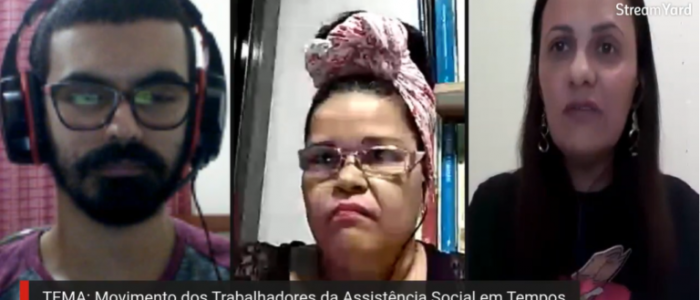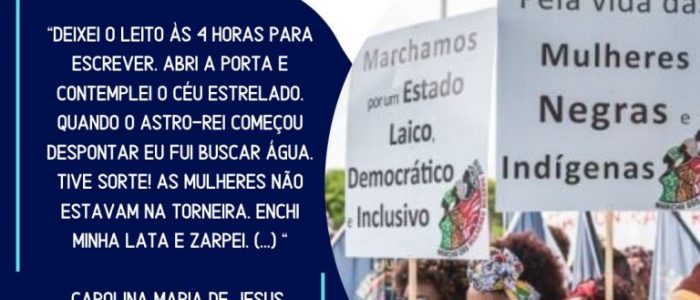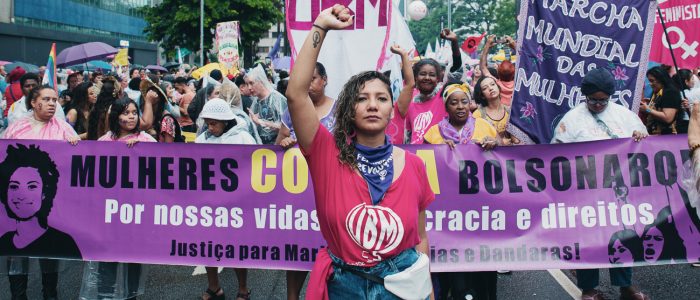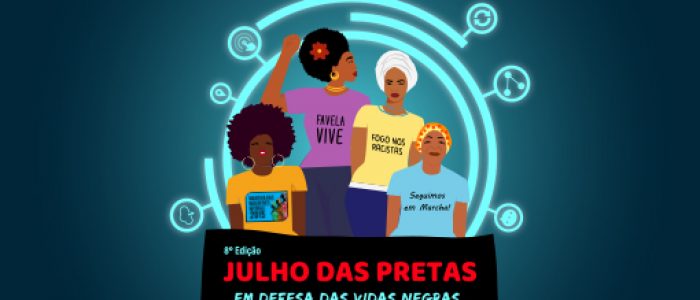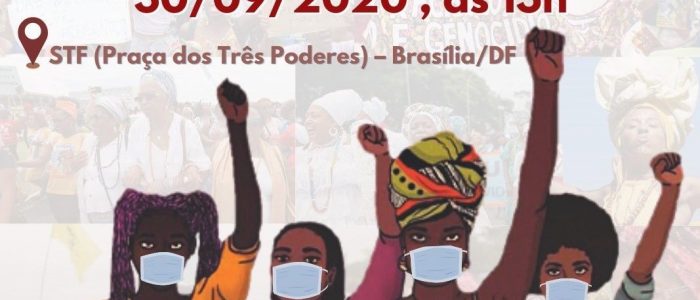The Association of Indigenous Peoples of Brazil (APIB) held a “live in solidarity” on December 1, 2020, with the theme “Indigenous Women on the Move”. The live featured Ana Paula Sabino, Hamangai Pataxó and Indiana Petsirei O Dumhive, among others. Access here.
Throughout the Covid-19 pandemic, feminist groups and movements, organizations such as UN Women, parliamentarians, researchers and feminist authors have pointed out the risks of the pandemic for women, especially the most vulnerable. Throughout the pandemic, Brazil has experienced an increase in cases of domestic violence, hunger and unemployment, with women showing higher numbers than men. Here we present mobilizations focused on preserving women or built by them.
- Mobilized groups: Indigenous and Quilombolas , Women
- Types of mobilization: Lives on Activism
Sonia Guajajara, one of the most important Brazilian indigenous leaders today, spoke on August 7, 2020 with reporters André Barrocal and Felipe Milanez, about the struggles of indigenous peoples against the new coronavirus pandemic. In that conversation, she linked the challenges faced in the context of the pandemic to the attacks perpetrated by the government of Jair Bolsonaro on the rights of indigenous peoples. Access here.
- Mobilized groups: Indigenous and Quilombolas , Women
- Types of mobilization: Lives on Activism
On June 17, 2020, sociologist Paulo Ramos, coordinator of the Reconexão Periferias project, spoke with Leila Borari, coordinator of the Association of Suraras do Tapajós Indigenous Women, about the pandemic and indigenous peoples. Access here.
- Mobilized groups: Collectives , Councils , Women , NGOs
- Types of mobilization: Lives on Activism
The Marcha das Margaridas organized the series of lives 'Prose of Daisies in times of a pandemic'. Broadcast live on FACEBOOK, YOUTUBE and PORTAL DA CONTAG, it addressed topics related to the political axes of the Political Platform of the Marcha das Margaridas. They are important contents and reflections about the problems and social, economic and political issues that, as a whole, have been affecting the lives of women.
In its fifth episode, the series discussed 'Territorial Rights and Commons: Struggle and Resistance'. This Live will have the moderation of Mazé Morais, family farmer, secretary of women at CONTAG and general coordinator of the 6th March of Daisies. The guests were: Maria Emilia Pacheco – FASE Advisor – Solidarity and Education, and member of the Executive Nuclei of the National Agroecology Articulation (ANA) and the Brazilian Forum on Food and Nutrition Sovereignty and Security (FBSSAN), Sandra Maria da Silva Andrade – Director of the Federation of Quilombola Communities of Minas Gerais (N'Golo), Executive Coordinator of the National Coordination of Articulation of Rural Black Quilombola Communities (CONAQ), and resident of Quilombo Carrapatos, in Tabatinga/MG, Helena Gomes da Silva – Movement Coordinator Interstate of the Quebradeiras de Coco Babaçu (MIQCB) regional Piauí, Cristiane Julião Pankararu – Anthropologist, integrates APOINME, APIB and collective Voz das Mulheres Indígenas. Access here.
- Mobilized groups: Academia , Indigenous and Quilombolas , Women
- Types of mobilization: Lives on Activism
Quilombola Selma Dealdina, from the National Coordination for the Articulation of Rural Black Communities and Quilombolas (Conaq), and the former Deputy Attorney General of the Republic, Deborah Duprat, talked about the topic “Inequalities: Quilombola Communities Facing the Pandemic”, on the day June 14, 2020. The moderation was in charge of Katia Maia, executive director of Oxfam Brazil. Access here.
- Mobilized groups: Academia , Collectives , Councils , Women , NGOs
- Types of mobilization: Lives on Activism
This debate, held on June 21, 2020, discussed the actions that psychologists and social movements are developing in the territories. It counts with the participation of Andrea Arruda (psychologist, member of the collectives Periferia Segui Sangrando and Escola Feminista AbyaYala), Rodrigo Silva Santos (State coordinator of the Emancipa Network of Popular Education Movement) and Glória Maria (journalist and audiovisual producer and producer of the battle of Paraisópolis). Access here.
- Mobilized groups: Academia , Collectives , Women
- Types of mobilization: Digital Activism , Lives about Activism
The Periferia Viva Solidarity Campaign organized a live on August 3, 2020, to discuss the profound impacts of the pandemic on women, inside and outside the home. The meeting had the participation of Débora Diniz, an anthropologist professor at the University of Brasília, and Isis Menezes Táboas, from Popular Consultation. Eliane Martins, Campaign coordinator, coordinates the debate. In the presentation, she argues, on the theme of the use of social media by the movements: “we are also kind of young here in this Internet story, so we are still a little confused, because our beach was not that virtual one, our beach was – still is – face-to-face… (we are) learning to deal with this space” (minute 10). Access here. To watch other lives organized by the Campaign, see the Facebook page .
- Mobilized groups: Collectives , Women
- Types of mobilization: Lives on Activism
The Cidades em Movimento platform promoted, on August 19, 2020, a chat about the strategies to face the new coronavirus carried out by collectives, organizations and social movements in the Manguinhos favela. Challenges related to food insecurity in the context of the Covid-19 pandemic were also addressed. The meeting was attended by: Márcia Corrêa e Castro, from the Coordination of the Campaign se Liga no Corona; Taís Ariza, nutritionist Ensp/Fiocruz; Jussara Rafael Ângelo, from the Coordination of Social Solidarity Action in Manguinhos and Paloma Gomes: Volunteer in the collective Manguinhos Solidário. Access here.
- Mobilized groups: Class associations and unions , women
- Types of mobilization: Lives on Activism
Live held on July 09, 2020 by the Multiple Knowledge Project with the theme: Social Assistance Workers Movement in times of a pandemic. The live was attended by Psychologist Vanessa Brito. Access here.
- Mobilized groups: Collectives , Women
- Types of mobilization: Lives on Activism
The live, held on the 06/10/2020th, was a moment of discussion and learning about the Lagunar de Maceió region. Rogério Dyaz, artist, founder of Coletivo Quintal Cultural and Movimento dos Povos das Alagoas; Vanessa Santos, representative of the Cooperative of Marisqueiras Mulheres Guerreiras – Coopmaris; Samuel Scarponi, representing the Lagoas Peoples Committee and Luciene Costa, representing Erê. The circle will be mediated by Mônica Nascimento, representative of the Collective of Support to Workers and Workers – CATT.
See it in full here.
- Types of mobilization: Lives on Activism
The proposal of the live Activism and Care, held on 08/06/2020, was to offer a space for exchanging and sharing experiences, bringing to the debate the themes of self-care and collective care in the various experiences of activism. Participants in the debate were: Lúcia Xavier, Maria Dolores and Gabi Negríndia. Access here.
- care , social movements , for women , health
- Mobilized groups: Collectives , Women
- Types of mobilization: Lives on Activism
Community leaders from the first class of BC Comunidades talk to award-winning social educator Bel Santos Mayer about transforming the territory where they live. BC Comunidades identifies, supports and gives visibility to new local leaders. An expansion program for the Brazil Conference in partnership with Insper. Participating in the discussion on August 7, 2020: – Audrey Ribeiro from FLIGRAJA (Grajaú SP) – Abidan Henrique from Km23 (Embu das Artes SP) – Flávia Rodrigues from Viela Mais Bonita (Paraisópolis – SP) – Ester Carro from Fazendinhando (Jardim Colombo, SP) – Romeu Mata from CDHU Jardim São Luiz (Jardim São Luiz, SP). Access here.
- Mobilized groups: Collectives , Women
- Types of mobilization: Lives on Activism
This debate, held by the São Paulo Regional Council of Psychology on 06/21/2020, sought to discuss the actions that psychologists and social movements are developing in the territories. Participants: Andrea Arruda, Rodrigo Silva Santos, Glória Maria.
- Mobilized groups: Collectives , Women , NGOs , International Organizations
- Types of mobilization: Lives on Activism
Live Periphery against the Pandemic was held on June 4, 2020 by the Rosa Luxemburgo Foundation. It had the support of the following guests: Rita de Cássia – representative of the MTSB, Débora Dias – coordinator of UNEafro Brasil, Tiaraju D'andrea – researcher at the Center for Peripheral Studies – CEP, Anielle Franco – from the Marielle Franco Institute, Jussara Basso – coordination of the MTST – Movement of Homeless Workers and Keli Mafort – national direction of MST Brazil. Access here.
- Mobilized groups: Collectives , Women
- Types of mobilization: Communication in the peripheries
The documentary intends to collaborate with the dissemination of information in the peripheries about prevention, self-care and data for the creation of public policies and other immediate initiatives. It will be based on the vision of 5 young people from the periphery of the five regions of the country. The three audiovisual collectives that drive the proposal for the documentary are: Maloka Filmes, formed by LGBTs from the South Zone of São Paulo; the Communication and Youth Center – CCJ in Recife (PE); and the Apeirom Collective of Ceilândia (DF).
- information , LGBTQIA+ , peripheries , for women , health
- Mobilized groups: Academia , Class Associations and Trade Unions , Collectives , Councils , Women , NGOs
- Types of mobilization: Protests in the Pandemic Era
Popular movements marked a “great act” to call for the “impeachment now” of the President of the Republic, Jair Bolsonaro, at a time when the country registered the mark of 211,000 deaths from Covid-19. The event took place on January 24, 2021 at Praça dos Três Poderes, in Brasília. Access here.
- Mobilized groups: Collectives , Women
- Types of mobilization: Protests in the Pandemic Era
The Movimiento por Nuestros Desaparecidos en México , formed by more than 60 collectives from Mexico and three Central American countries, demands that the Mexican government does not stop the search for the 61,000 disappeared and that efforts be accelerated to identify more than 37,000 bodies. On Mother's Day (10 May), demonstrators took to the streets but also used forms of digital protest, including a digital march. The traditional National March of Dignity: Mothers Seeking their Disappeared Family Members, Truth and Justice, was held digitally for the first time. Participants posted photos online with masks, on which was written: "where are you?"
In addition, they communicated using hashtags such as #YoApoyoParaEncontrarles, #HastaEncontrarles, #NosHacenFalta and #10DeMayoNadaQuéCelebrar. For more information, see also this analysis by Thomas Aurelani .
- Mobilized groups: Women
- Types of mobilization: Public Manifests
“The women of the Amazon basin and the sisters of Latin America and the Caribbean are facing a systematic and growing threat to our lives since the beginning of the Covid-19 pandemic as a consequence of the historical inequalities that the patriarchal neoliberal capitalist colonial system seeks perpetuate in the face of the indifference of the States to those that are not important in our lives.” Access the full document here.
- Mobilized groups: Women , Black Population
- Types of mobilization: Public Manifests
Letter from black women about concerns about the impacts of covid-19, signed by the Articulation of Brazilian Black Women's Organizations (AMNB).
- Mobilized groups: Collectives , Indigenous and Quilombolas , Women , Black Population
- Types of mobilization: Public Manifests
“The Toda as Vidas Valem was launched by the National Human Rights Movement (MNDH) on May 15, 2020. The Campaign's main objective is to mobilize human rights organizations to guarantee human rights in the context of Covid-19. -19. As specific objectives, the Campaign aims to: a) organize solidarity to care for groups and segments with the greatest need for protection; b) promote actions to monitor human rights violations in the context of the pandemic; c) carry out training actions to strengthen human rights organizations. […]”. Check out the full document here.
- Mobilized groups: Women
- Types of mobilization: Public Manifestos , Protests in the Pandemic Era
The Manifesto draws attention to the government's wrong policy in the fight against the coronavirus, to the genocide of young black people, increasing inequalities and impoverishment of the population. “We fight for the end of slavery and fascism, against the military dictatorship and for democracy. We demand an answer on Who Commanded to Kill Marielle and we will overthrow Bolsonaro and Mourão!”, highlights the document. Access the full manifest.
- Mobilized groups: Collectives , Women
- Types of mobilization: Public Manifests
To combat losses from the social and economic crisis caused by Covid-19, Unisol Brasil and hundreds of entities published the “Manifesto in Defense of the Food and Healthy Food Acquisition Program for the people”. Check it out here.
- Mobilized groups: Women , Black Population
- Types of mobilization: Public Manifests
The National Articulation of Black Young Feminists (ANJF) issued an open letter on reflections of the Articulation in times of a pandemic. Check it out here.
- Mobilized groups: Collectives , Women
- Types of mobilization: Public Manifests
The Articulation of Brazilian Women issued a note with some propositions in the face of the pandemic scenario, including the impeachment of the Bolsonaro-Mourão government.
- Mobilized groups: Collectives , Women , NGOs , Black Population
- Types of mobilization: Public Manifests
The Julio das Pretas campaign was developed from the unit of black women's movements in Bahia, Northeast Region, and a few other states in the country, such as Paraná, Pará, Amapá, Minas Gerais, Rio de Janeiro, São Paulo, and the Federal District. , and is aimed at strengthening black women's agendas and organizations. Access here.
- Mobilized groups: Women , Black Population
- Types of mobilization: Public Manifests
Black Women deliver a Public Letter to the STF under the motto “Black Women Move Brazil for Rights” and seek a commitment to the end of racism and sexism.
The group seeks to represent more than 55 million black Brazilian women. Access here .
- Mobilized Groups: Class Associations and Unions , Collectives , Women
- Types of mobilization: Digital Activism , Pro and anti-vaccine campaigns , Online protests
Mobilizations in favor of the vaccine were very important on social media, especially throughout 2021. This is the case of the tweet called by various public entities and people on February 24, 2021, which used the hashtag #VacinaParaTodosJá. Also check out the live from the Vaccine Campaign for All Now .
- lives , tweet , vaccination
- Mobilized groups: Women , Black Population
- Types of mobilization: Other mobilizations
The Cândido Advocacia office offered free legal advice via the internet to the black and peripheral population. The consultations prioritized assistance aimed at issues of racial discrimination, domestic violence, labor and consumer rights. You can learn more about the initiative through the office's Instagram .
- Mobilized groups: Women , Black Population
- Types of mobilization: Other mobilizations
Covid in Prisons is an initiative that provides information to mothers and family members, publicizes important lawsuits in this context and legislation that supports the rights of people deprived of their liberty. During the pandemic, he also followed the cases of the disease in institutions of deprivation of liberty in Brazil.



